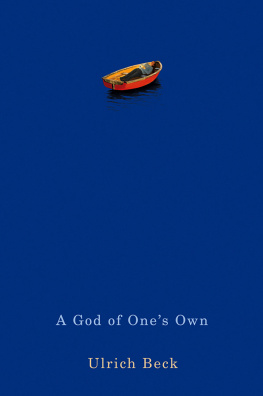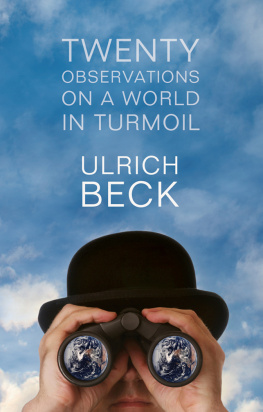
First published in German as Der eigene Gott Suhrkamp Verlag Frankfurt am Main 2008
This English edition Polity Press, 2010
Polity Press
65 Bridge Street
Cambridge CB2 1UR, UK
Polity Press
350 Main Street
Malden, MA 02148, USA
All rights reserved. Except for the quotation of short passages for the purpose of criticism and review, no part of this publication may be reproduced, stored in a retrieval system, or transmitted, in any form or by any means, electronic, mechanical, photocopying, recording or otherwise, without the prior permission of the publisher.
ISBN-13: 978-0-7456-4618-3
ISBN-13: 978-0-7456-4619-0(pb)
ISBN-13: 978-0-7456-9466-5(epub)
ISBN-13: 978-0-7456-9373-6(mobi)
A catalogue record for this book is available from the British Library.
The publisher has used its best endeavours to ensure that the URLs for external websites referred to in this book are correct and active at the time of going to press. However, the publisher has no responsibility for the websites and can make no guarantee that a site will remain live or that the content is or will remain appropriate.
Every effort has been made to trace all copyright holders, but if any have been inadvertently overlooked the publisher will be pleased to include any necessary credits in any subsequent reprint or edition.
The translation of this work was supported by a grant from the Goethe-Institut which is funded by the German Ministry of Foreign Affairs.
For further information on Polity, visit our website: www.politybooks.com
Acknowledgements
This book has undergone a number of revisions, all of which were the object of intensive discussions. Natan Sznaider, Edgar Grande and Christoph Lau, in particular, read all of it at every stage of the birth process and they all took part in intensive discussions about it with me. Their criticisms, proposed additions and suggestions for further reading were not the least important incentives spurring me on to further revisions. At an early stage, Navid Kermani took the trouble to discuss my fundamental thesis with me. The same goes for Wolfgang Bon and Sven Hillenkamp. A public debate with Arnold Angenendt and of course his book Toleranz und Gewalt: Das Christentum zwischen Bibel und Schwert [Tolerance and Violence: Christianity between the Bible and the Sword] have had a major influence on my argument. Once again, my lifelong discussions with Elisabeth Beck-Gernsheim have played an essential part in helping me formulate my ideas. They all deserve my warmest thanks, without of course being responsible for my exaggerations and omissions.
In times like these, when the very existence of the social sciences and the humanities is under threat as seldom before, it is of vital importance to testify that without the creative discussions that took place in the framework of the research group investigating the nature of reflexive modernization, this adventurous excursion into the fascinating byways of the volcanic landscapes of religion would never have been possible. And the efforts of that research group were made possible in their turn only through the generous financial assistance of the Deutsche Forschungsgemeinschaft. For that reason my heartfelt thanks are due to the DFG and to all those who helped to make this labour of co-operative sociological curiosity a reality.
The Diary of a God of One's Own
Etty Hillesum: An Unsociological Introduction
Is it possible to begin a book with a confession of failure? Yes, it is possible and, in this instance, essential, even though the irony implicit in the question is unmistakable, since the question contains its own answer. Nor is it an expression of arrogance (as some readers may perhaps surmise); it is not a frivolous game with one's own limitations and blind spots. No doubt, a certain metaphysical ingenuousness is needed to coin the glib phrase a God of one's own and to expound it (whatever that might mean). In principle, however, the sphere of religion relates to that of sociology like fire to the water that puts it out.
As a sociologist with a firm belief in the redemptive power of sociological enlightenment, I have the idiom of secularism in my blood. The premise of secularism more specifically, the idea that with the advance of modernization, religion will automatically disappear cannot simply be expunged from sociological thinking, not even if that prognosis were to be refuted by history. It is for this reason that the contents of religious beliefs, with their relatively autonomous force and reality, their visions of a different humanity and their power to make whole worlds tremble, are so rarely exposed in their full ambivalence to the gaze of sociology. Sociologists are more concerned to demonstrate that even though rain-dancing Indians produce no rain with their dance, they successfully interact, because their dance has the function of contributing towards the integration of the group. However, such an approach tells us absolutely nothing about the whys and the wherefores of the cultural productivity and destructiveness of religious belief.
In sociology such lacunae are regarded not as defects, but as proof of scientific integrity. The discipline concerns itself with only one half of such basic religious distinctions as that between creator and creation, eternity and time, the next world and this one. Even if sociologists do not deny the depth and power of religious feelings, they refuse to accept that religious phenomena must be understood and explained in religious terms. Instead, they establish a methodological secularism, according to which religious phenomena are primarily seen as having social causes and functions. And that is as it should be: it satisfies the sceptical scientific mind.
However, such a view is in conformity with the process of secularization. It makes visible its own leading idea: the de-mystification of the religious sphere. And it renders invisible and incomprehensible something that increasingly determines reality, namely the re-mystification of reality by religion. Hence it is not necessary to be religious but merely to think consistently in sociological terms to be subject to doubts about whether the a-religious or anti-religious tendency of sociological scepticism is best suited to decoding not just the religious significance of a God of one's own, but its social and political power as well. Thus the present book sets out on what is doubtless a vain quest for an alliance of fire and water in the service of both: that is to say, of sociology's claims to knowledge and perhaps also of religion's own self-understanding.
Etty Hillesum
In her diary Etty Hillesum, a Jewish woman from the Netherlands, left a record of the God of her own she had sought and found. Her handwritten diary entries start in March 1941 and end in October 1943. At the beginning of her diary the young woman leads the life of an ordinary citizen, although her very existence is threatened by the racist delusions of National Socialism. As her outward life became increasingly confined, Etty Hillesum progressively turned her gaze inwards. She read Rilke, Dostoevsky, Pushkin, St Augustine and, again and again, the Bible. Slowly and almost imperceptibly, the conversation with herself turned into a conversation with God. Etty Hillesum even developed a special style for speaking to God. She talks to God as if talking to herself. She speaks to Him directly without a trace of self-consciousness. Self-discovery and the discovery of God, finding herself and finding God, inventing herself and inventing God all merge naturally into one. Her own God is not the God of the synagogues or the churches or the believers, as distinct from the unbelievers. Her God knows nothing of heresy, the Crusades, and the unspeakable cruelties of the Inquisition, Reformation and Counter-Reformation, or of the mass murders of religiously motivated terrorism. Her God is free from theology and dogma; He is blind to history and, perhaps for that very reason, merciful and helpless. She says, When I pray, I never pray for myself, but always for others, or else I carry on a crazy or childlike or deadly serious dialogue with whatever is profoundest in me and which for simplicity's sake I call God (Hillesum 1981: 165).
Next page













